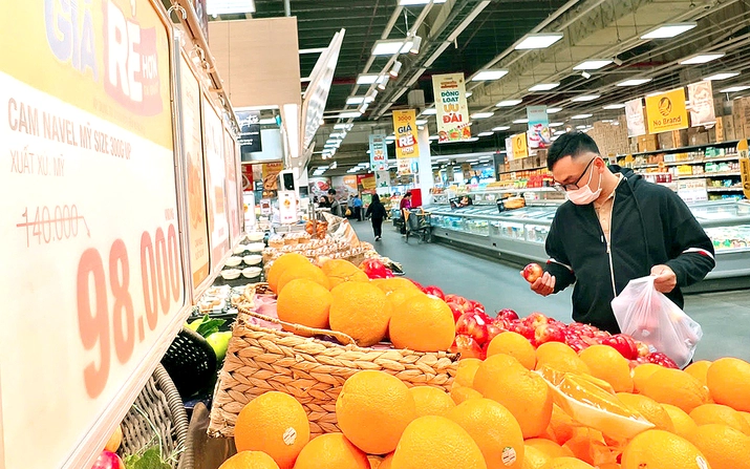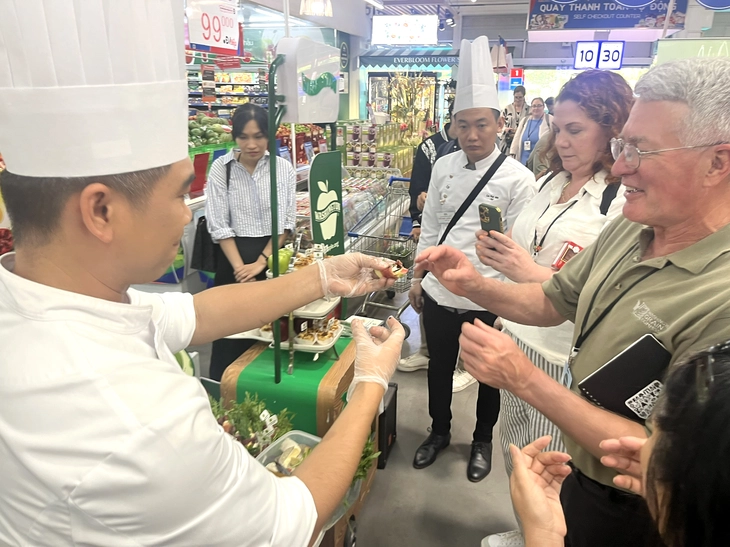
Among the fruits imported from the U.S., apples are the most widely available at supermarkets in Vietnam. Photo: Nhat Xuan / Tuoi Tre
According to the Ministry of Agriculture and Environment, Vietnam imported US$595.6 million worth of fruits and vegetables in the first quarter, up 21 percent compared to the same period in 2024. Of this, U.S. fruit and vegetable imports accounted for 27 percent, second only to China.
Compared to the same period last year, the value of fruit and vegetable imports from the U.S. last quarter surged 53.1 percent.
Although many U.S. agricultural products benefiting from Vietnam's tariff reductions have yet to be imported into the country, demand for these products has started to rise as several supermarket chains have proactively promoted and discounted prices.
Prices of US agricultural products drop in Vietnam
At Emart Supermarket on Phan Van Tri Street in Go Vap District, Ho Chi Minh City, Big C, Go!, and Co.opmart supermarkets across the city, numerous U.S.-origin products occupy significant space in the shelves for imported food.
U.S. products were prominently displayed in central positions with attractive promotional offers.
At Emart, a dedicated section for U.S. fresh fruits was arranged with clear labels. Various types of U.S. apples, such as Fuji, Gala, Granny Smith, and Cosmic Crisp, were abundantly available, dominating other fruit imports.
Many items were being sold at deep discounts, such as U.S. Gala apples seeing its price reducing to VND88,000 ($3.4) from VND125,000 ($4.8) per kilogram, and U.S. Navel oranges, to VND98,000 ($3.8) from VND140,000 ($5.4), making them highly competitive against domestic fruits and those from South Korea, Australia, and New Zealand.
In addition to fruits, packaged food items from the U.S., such as walnuts, chestnuts, chocolate, and biscuits, were prominently displayed.
Frozen items like U.S. beef and chicken saw stable demand.
Large potential for further growth
Cao Anh Tuan, an agricultural exporter, said that businesses are adapting to a strategy of reducing exports to the U.S. while increasing American imports.
"We are finding ways to export processed fruits to the U.S. market, but from now on, we will focus more on utilizing goods and collaborating with American companies," Tuan informed.
After the U.S. announced reciprocal tariffs on several countries on April 3, including Vietnam, he communicated with U.S. partners via email, and they expressed concerns about Vietnam's import tariffs that made U.S. goods less competitive compared to markets that have free trade agreements with Vietnam, such as the European Union, Canada, and Australia. Products from these markets enjopy a zero-percent import tax rate.
If taxes are reduced, Vietnamese consumers will have more access to U.S. agricultural products, which could result in increased U.S. exports to Vietnam.
Domestic businesses will import U.S. wheat, walnuts, almonds, pistachios, and other fruits. Therefore, there is still significant potential for increasing U.S. agricultural imports, Tuan analyzed.
In addition to fruits, Vietnam imports billions of U.S. dollars' worth of raw materials such as wheat, soybeans, corn, and soybean meals for food and animal feed production. Although these are products that the U.S. has an advantage in, Vietnamese businesses have historically sourced them from Brazil, Australia, and Russia, with a zero-percent tax rate.
Nguyen Van Huan, chief accountant of an animal feed production plant in Tien Giang Province, southern Vietnam, said that if the import tax on raw materials from the U.S. is reduced, Vietnamese companies would increase imports from the U.S..

Chefs introduce dishes made from U.S. apples and beef at a supermarket in Vietnam. Photo: N.Binh / Tuoi Tre
According to the U.S. Department of Agriculture, American agricultural products are consumed across various sectors in Vietnam, ranging from retail to hotels, restaurants, and food processing.
Vietnam imports American agricultural products in large quantities, making it a potential market for fresh U.S. fruits.
US products gain popularity on e-commerce platforms
U.S. products are increasingly popular on e-commerce platforms and online sales channels, with frequent flash sales and promotional offers. U.S. apples, blueberries, nut milk, and organic cereals are being offered at competitive prices, with free delivery services or additional vouchers as incentives.
In the personal care and dietary supplement sectors, U.S. products continue to hold a strong position and are highly favored by consumers. In stores selling imported cosmetics, U.S. brands such as L’Oréal Paris, Estée Lauder, Paula’s Choice, Cetaphil, Maybelline, and Dove are displayed prominently.
"About 70 percent of the personal care products I use are from the U.S., especially vitamin products and acne treatment cosmetics like Paula’s Choice. Even though they are more expensive than other brands, they are reliable in terms of quality and guarantee, especially with clear labeling and return policies," said Le Thi Ha, a 25-year-old office worker in Binh Thanh District, Ho Chi Minh City.
US delegations promotes agricultural, seafood products to Vietnam
Several major supermarkets and distributors in Ho Chi Minh City have reported receiving numerous trade delegations from U.S. states and the U.S. government that sought opportunities to sell their products in Vietnam.
According to a representative from MM Mega Market Vietnam, in early April, the chain welcomed a delegation of 10 U.S. companies to explore the Vietnamese market. The U.S. companies were eager to introduce beef, agricultural goods, and various types of butter.
In 2024, MM Mega Market also hosted a trade delegation from the U.S. Department of Agriculture, which included 58 companies specializing in dairy, nuts, fruits, meat, poultry, popcorn, processed foods, and wine, to promote trade with Vietnam.
These trade promotion programs have provided a comprehensive view of the retail industry and consumer preferences in Vietnam, helping U.S. companies better understand the tastes and purchasing power of Vietnamese consumers, said the representative from MM Mega Market.


Max: 1500 characters
There are no comments yet. Be the first to comment.